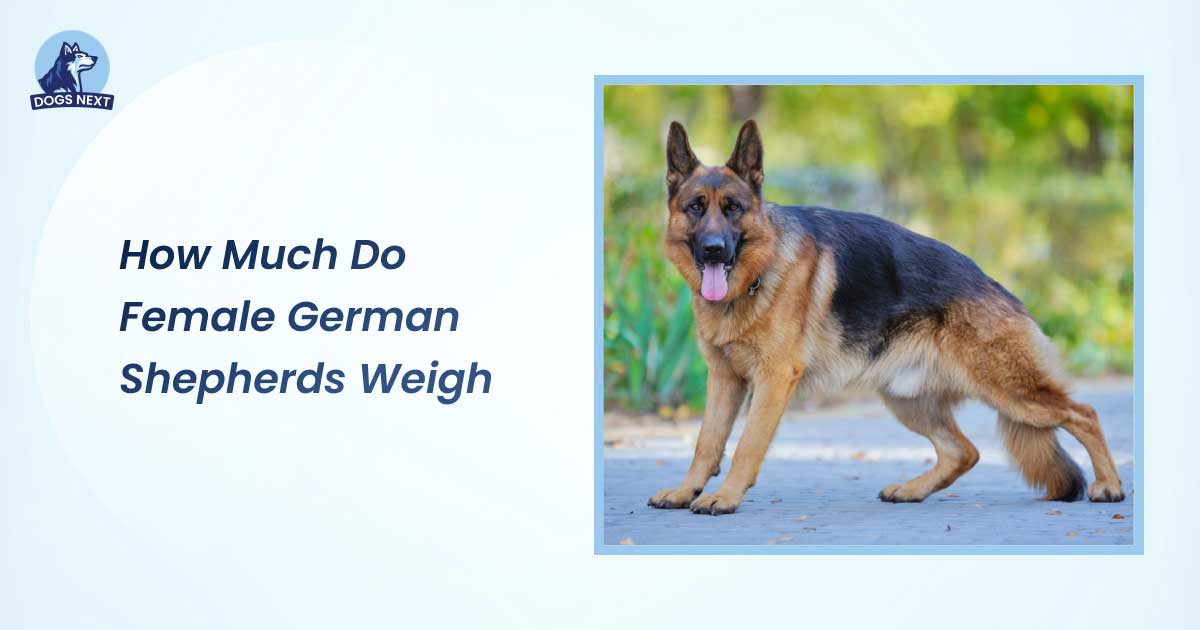Female German Shepherds typically weigh between 50 to 70 pounds. Their weight depends on genetics, diet, and exercise.
German Shepherds are popular for their intelligence, loyalty, and versatility. Female German Shepherds, in particular, are known for their balanced build and agility. These dogs are often used in roles such as search and rescue, police work, and as loyal family pets.
Proper care, including a balanced diet and regular exercise, is essential to maintain their healthy weight and overall well-being. Understanding their weight range helps owners manage their health effectively. Female German Shepherds’ weight can vary slightly, but staying within the 50 to 70-pound range ensures they remain fit and active. Regular vet check-ups also play a crucial role in maintaining their optimal health.
Weight Ranges
Understanding how much female German Shepherds weigh helps in maintaining their health. The weight ranges vary at different life stages. Knowing these ranges ensures your dog stays in optimal health. This guide outlines the weight ranges for female German Shepherds at various life stages and when fully grown.
Average Weight At Various Life Stages (puppy, Adolescent, Adult)
Female German Shepherd weight changes as they grow. Here’s a detailed look at the average weight at different stages:
- Puppy (0-6 months): During the initial months, female German Shepherd puppies experience rapid growth. At birth, they weigh around 1 pound. By six months, they can weigh between 44-49 pounds.
- Adolescent (6-18 months): This is a crucial period in the GSD weight guide. At 6 months, they weigh around 44-49 pounds. By 12 months, their weight can range between 55-60 pounds. At 18 months, they reach near-adult weight, ranging from 60-66 pounds.
- Adult (18+ months): As adults, female German Shepherds stabilize in weight. A healthy adult female can weigh between 66-70 pounds. Maintaining this weight is vital for their overall health.
Here’s a quick table summarizing the female GSD weight by age:
| Life Stage | Average Weight (lbs) |
| Puppy (0-6 months) | 1-49 lbs |
| Adolescent (6-18 months) | 44-66 lbs |
| Adult (18+ months) | 66-70 lbs |
Weight Range For Fully Grown Female German Shepherds
A fully grown female German Shepherd typically weighs between 66-70 pounds. This weight range is considered healthy. Factors like diet, exercise, and genetics impact their weight. Keeping track of your dog’s weight ensures they remain healthy and active.
Here are a few tips to maintain a healthy weight for your female German Shepherd:
- Balanced Diet: Provide a diet rich in nutrients.
- Regular Exercise: Ensure daily exercise to keep them fit.
- Regular Vet Check-ups: Monitor their health with regular vet visits.
Keeping your female German Shepherd within the recommended weight range ensures a healthy and happy life.
Factors Influencing Weight
Understanding how much female German Shepherds weigh involves looking at various factors influencing weight. Every dog is unique, and many elements play a role in determining their weight. Knowing these factors can help ensure your dog maintains a healthy weight.
Importance Of Balanced Diet, Exercise, And Genetics
A balanced dog diet is crucial for maintaining a healthy weight. Female German Shepherds need the right mix of proteins, fats, and carbohydrates. A poor diet can lead to obesity or underweight issues.
- Proteins: Essential for muscle development and repair.
- Fats: Provide energy and support cell growth.
- Carbohydrates: Important for energy but should be balanced.
Exercise also plays a significant role in healthy dog weight maintenance. Regular physical activity helps burn calories and keeps muscles strong. Lack of exercise can lead to weight gain and related health problems.
Genetics are another major GSD weight influence. Some German Shepherds are genetically predisposed to be larger or smaller. Knowing the dog’s lineage can provide insights into their ideal weight range.
How Age, Health, And Lifestyle Affect Weight
Age is one of the primary factors affecting dog weight. Puppies are lighter and grow rapidly. Adult German Shepherds reach their full weight by around 18 months. Senior dogs may lose weight due to muscle loss or health issues.
Health conditions can also impact weight. Thyroid problems, diabetes, and other diseases can cause weight fluctuations. Regular vet check-ups are vital for early detection and management of these conditions.
Lifestyle choices significantly affect a dog’s weight. Dogs that are active and have plenty of playtime tend to maintain a healthier weight. In contrast, dogs with a sedentary lifestyle are more likely to gain weight.
Here is a table summarizing these factors:
| Factor | Influence on Weight |
| Diet | Balanced diet helps maintain healthy weight |
| Exercise | Regular exercise prevents weight gain |
| Genetics | Genetic predisposition affects weight range |
| Age | Puppies grow, adults stabilize, seniors may lose weight |
| Health | Medical conditions can cause weight changes |
| Lifestyle | Active lifestyle promotes healthy weight |
Understanding these factors can help you keep your female German Shepherd at a healthy weight.
Weight Maintenance
Female German Shepherds typically weigh between 50 to 70 pounds. Maintaining this weight is crucial for their health and longevity. Proper weight maintenance involves a balanced diet and regular exercise. This section will provide essential tips for dog weight management and ensuring a healthy dog lifestyle for your German Shepherd.
Tips For Maintaining A Healthy Weight Through Diet And Exercise
Ensuring your German Shepherd maintains a healthy weight involves several key practices. Follow these dog health tips to keep your dog in optimal condition.
Balanced Diet:
- High-Quality Food: Feed your dog high-quality commercial dog food designed for large breeds.
- Portion Control: Measure portions according to the dog’s weight and activity level.
- Regular Feeding Schedule: Establish consistent feeding times to regulate metabolism.
- Avoid Human Food: Human food can be unhealthy and add unnecessary calories.
Exercise:
- Daily Walks: Walk your dog for at least 30 minutes twice a day.
- Playtime: Engage in interactive play, such as fetch or tug-of-war.
- Training Sessions: Combine obedience training with physical activity.
- Dog Sports: Consider agility or other dog sports for additional exercise.
Monitoring For Obesity Or Weight Loss Concerns
Regular monitoring is crucial in weight maintenance for GSDs. Be vigilant for signs of obesity or weight loss.
| Condition | Signs | Action |
| Obesity | Difficulty breathing, excessive panting, inability to exercise, visible fat deposits | Consult a vet, adjust diet, increase exercise |
| Weight Loss | Rib bones visible, lethargy, decreased appetite | Consult a vet, check for underlying health issues, adjust diet |
Regularly weigh your dog and keep a weight log. This helps track changes and spot trends early. Use these dog health tips to maintain a healthy dog lifestyle for your German Shepherd.
Nutrition And Exercise
Female German Shepherds are known for their strength, agility, and loyalty. Their weight can vary, but proper nutrition and exercise play a vital role in maintaining their health. Understanding the best practices for feeding and exercising your female GSD is crucial to ensuring she stays fit and healthy.
Best Practices For Feeding Female German Shepherds
Feeding your female German Shepherd (GSD) the right diet is essential for her well-being. GSD nutrition needs to balance proteins, fats, and carbohydrates. Here are some feeding tips for GSD:
- High-Quality Protein: Ensure her diet includes high-quality protein sources like chicken, beef, or fish. Proteins support muscle development and repair.
- Healthy Fats: Include healthy fats such as fish oil or flaxseed oil. Fats are crucial for a shiny coat and overall health.
- Carbohydrates: Provide complex carbohydrates like brown rice or sweet potatoes for sustained energy.
- Vitamins and Minerals: Incorporate fruits and vegetables to supply essential vitamins and minerals.
- Portion Control: Divide her meals into two servings per day to prevent overeating and obesity.
Here is a sample diet plan for a female German Shepherd:
| Meal | Food | Portion |
| Breakfast | Chicken breast, brown rice, spinach | 1 cup |
| Dinner | Beef, sweet potato, broccoli | 1 cup |
Recommended Exercise Routines For Fitness
Regular exercise for German Shepherds is crucial for maintaining a healthy weight and mental well-being. Here is a simple dog exercise guide:
- Daily Walks: Aim for at least 30 to 60 minutes of walking every day. Walking helps to burn off energy and keeps her fit.
- Playtime: Engage in games like fetch or tug-of-war. These activities provide both physical exercise and mental stimulation.
- Agility Training: Set up an obstacle course in your backyard. Agility training boosts coordination and confidence.
- Swimming: If possible, take her swimming. Swimming is a low-impact exercise that’s easy on the joints.
- Obedience Training: Incorporate obedience training sessions. Training exercises her mind and body.
Consistency in following these routines ensures your female GSD stays healthy and happy. Exercise combined with balanced nutrition forms the foundation for a robust and energetic German Shepherd.
Frequently Asked Questions
What Is The Average Weight Of Female German Shepherds?
Female German Shepherds typically weigh between 50 to 70 pounds. This weight can vary based on genetics and diet.
Do Female German Shepherds Weigh Less Than Males?
Yes, female German Shepherds generally weigh less than males. Males can weigh up to 90 pounds.
How Does Diet Affect A Female German Shepherd’s Weight?
A balanced diet is crucial for maintaining a healthy weight. Overfeeding can lead to obesity, underfeeding to malnutrition.
At What Age Do Female German Shepherds Reach Full Weight?
Female German Shepherds usually reach their full weight by 18 to 24 months. Proper nutrition supports healthy growth.
Conclusion
Understanding the weight of female German Shepherds helps in providing proper care. They typically weigh between 50 to 70 pounds. Regular vet check-ups and a balanced diet ensure their well-being. Keeping track of their weight helps maintain a healthy lifestyle.
Your German Shepherd will thrive with the right attention and care.

I’m David, an expert contributor and writer, with two furry friends of my own, I know the challenges of raising and caring for dogs. From training to nutrition and health, my goal is to provide valuable insights and advice to help create strong bonds and happy, healthy lives. Find me in Twitter.




